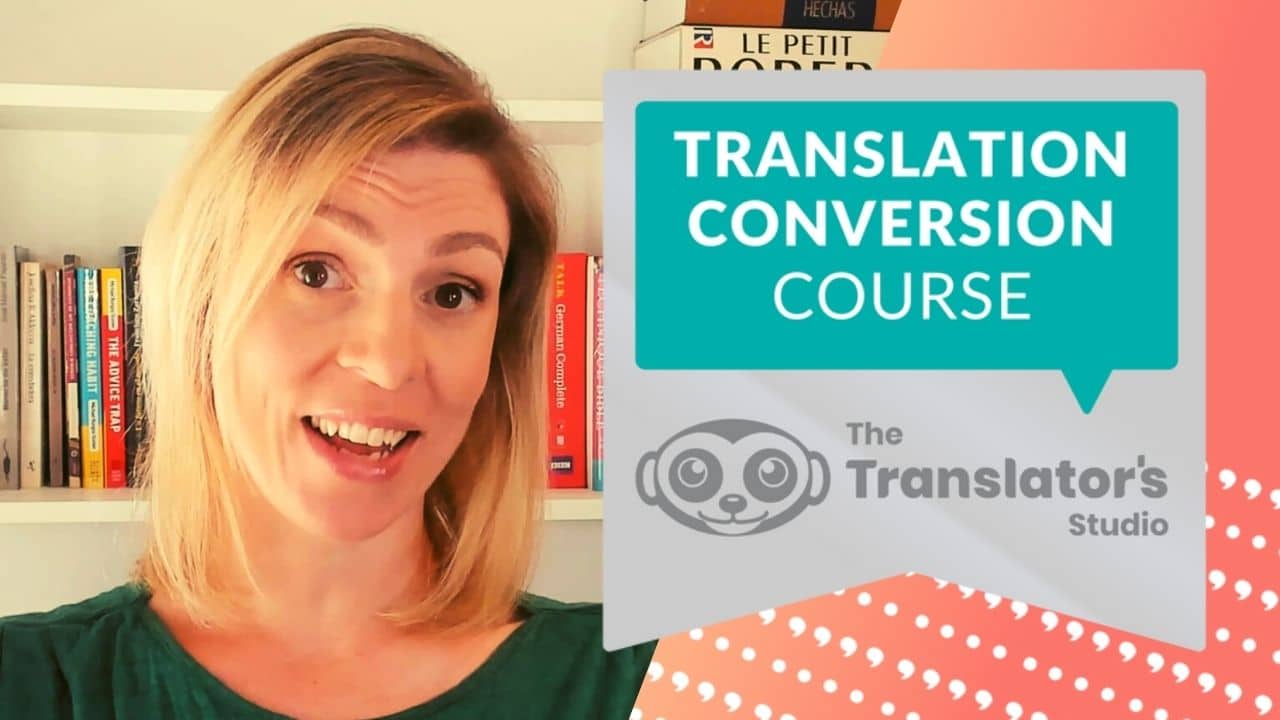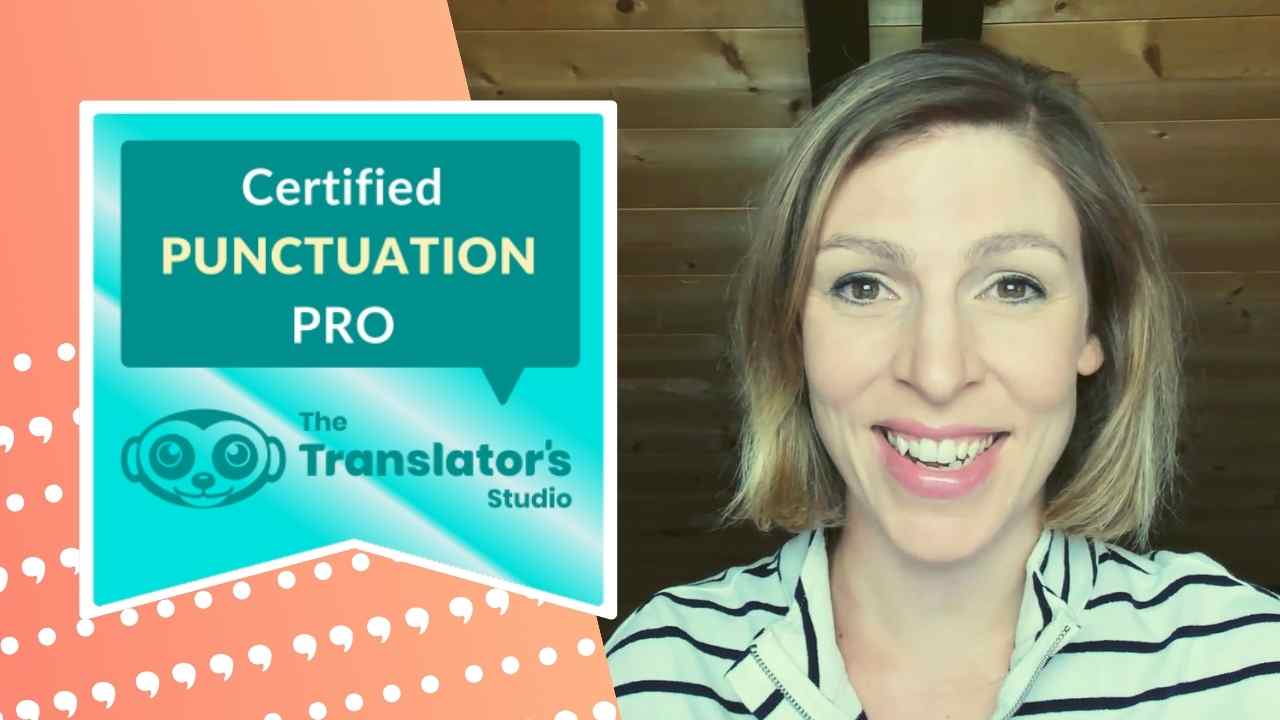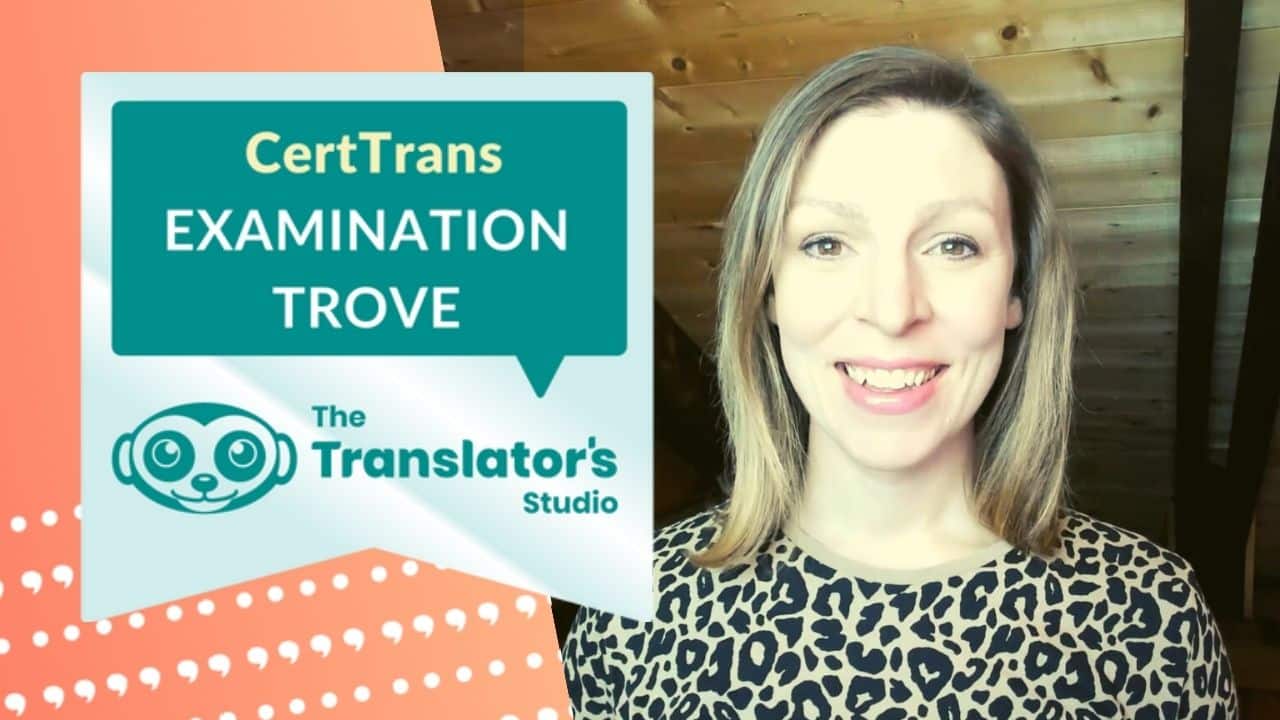DipTrans course
Pass the DipTrans Exam
The Diploma in Translation (DipTrans) exam, provided by the Chartered Institute of Linguists, UK, is a post-graduate qualification. The Advanced Translation Course with DipTrans preparation will make you a top professional translator and help you pass the DipTrans exam.
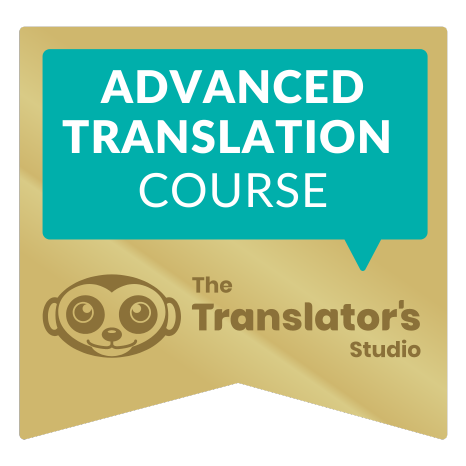
The Advanced Translation Course helps experienced translators prepare for success in the CIOL DipTrans
Timing
120 hours, self-paced
10 modules + extras
Languages
Spanish to English
French to English
Level
Postgraduate (level 7), DipTrans
Format
100% online translation course
Our 10-module diploma in translation course is like a boot camp for your translation skills. Designed for experienced translators, it’ll take you on a journey that will make you a more confident and more expert translator.
It starts by helping you analyse your translation process and really understand what it means to draft, check, edit and proofread a translation. With that under your belt, you’ll move on to looking at the different specialist areas tested in the CIOL DipTrans exam: journalism, technology, business, literature, science, social science, law and arts and culture. We’re an official DipTrans training centre listed on the CIOL website. All our translation courses are online, which means we serve translators and aspiring translators worldwide.
Why choose us?
Extremely detailed feedback is where we excel. Our feedback is much more than just a proofread or a few comments. Our teachers dedicate between an hour and an hour and a half to each feedback we do creating around 50 comments on each translation. This gives us time to deeply examine your work and produce highly personalised feedback to show you how to improve and pass your translation exams.
What our students say about our translation courses
Course modules
The 10 modules cover translation theory, translation techniques, editing, proofreading, English writing skills, glossary building and specialist translation.
Assessment
In total, you’ll do 10 marked assessments. The texts are based on CIOL DipTrans past papers, which are assessed at post-graduate level 7. The texts come from the real world, which makes them excellent learning tools, whether or not you’re sitting the exam. In addition to that, there are 18 further texts with sample translations, so you can do extra practice and build up experience. That’s 28 past papers in total.
You’ll get thorough, personalised feedback on the work you submit. We’ll also provide a sample translation and the examiner report. On top of that, you’ll have three 30-minute tutorials. The tutorials are carefully planned and cover a lot of ground. It’s also a great opportunity to ask anything you want about translation, the exam and freelancing in general.
Examination Trove
The Examination Trove is a special section dedicated to preparing for the diploma in translation (DipTrans) exam offered by the Chartered Institute of Linguists. It’ll help you prepare your strategy and timing. You’ll also get insight into what the examiners are looking for. The Examination Trove is packed with information to help you prepare for your translation exam.
Tasks, quizzes and bonus video
The course includes a bonus video that will test your knowledge of the technicalities of written English. The modules also contain tasks and quizzes to keep you on your toes.
Networking & more practice
And last but not least, don’t forget the networking. You’ll have the opportunity to get to know other translators in our private Facebook group: The Translator’s Studio Facebook Academy Group. It’s a great place to find new colleagues and friends. We also have a study buddy system where our trainees are encouraged to work together to do extra practice. Study buddies are particularly useful if you’re doing this as a DipTrans preparatory course.
You’ll come out of the course a more confident and more employable translator. You’ll have a network, more experience and will be another step up the ladder in your professional development. If you’re preparing for the DipTrans, then you’ll have an exam strategy in place and a well-above-average chance of passing.
This course is suitable for professional translators with at least two years’ full-time translation experience. If you’re a less experienced translator or a language graduate, or if you’ve done a bit of translation on the side but without ever studying it, start with our Professional Translation Conversion Course (CertTrans).
Testimonials

Helen Jones, LinkedIn.

Matthew Dykes, LinkedIn.

Helen Gräwert, LinkedIn.
Course Syllabus
Start Here Section
Examination Trove
Module 1. Getting Your Translation Process on Track
Assessed assignment: 600-word general translation (a newspaper article, based on DipTrans paper 1).
Extra self-assessed practice: 600-word general translation, module tasks and quiz.
Module 2. Editing and Proofreading
A whole unit dedicated to getting better at editing your translations. The module breaks the editing process down into its different stages. You’ll think about the challenges of editing your own work and get tips for reviewing professionally. It also looks at the difference between accurate and literal translations.
Assessed assignment: 600-word general translation (a newspaper article, based on DipTrans paper 1).
Extra self-assessed practice: 600-word general translation and module quiz.
Module 3. General Translation (Journalism)
The general unit discusses translation challenges that are specific to journalistic texts. You’ll also learn about the concepts of macrotext, microtext and target reader.
Assessed assignment: 600-word general translation (a newspaper article, based on DipTrans paper 1).
Extra self-assessed practice: 600-word general translation and module quiz.
Tutorial 1
Module 4. Translating in Technology
The technology unit will highlight issues that technical translators have to deal with. It also deals with the concepts from translation theory of decoding and encoding and shows you how to apply them in your translation process.
Assessed assignment: 450-word technology translation (based on DipTrans paper 2).
Extra self-assessed practice: 450-word technology translation and module quiz.
Module 5. Translating Business Texts
Translation challenges in the business genre are the focus of this unit. Within translation theory, the module looks at the key concept of skopos.
Assessed assignment: 450-word business translation (based on DipTrans paper 2).
Extra self-assessed practice: 450-word business translation and module quiz.
Module 6. Literary Translation
The manual for this module will help you discover elements of translation that are specific to literary texts. As part of your training in translation theory, you’ll learn about the concept of culture-specific items, and why they’re important in translation.
Assessed assignment: 450-word literary translation (based on DipTrans paper 2).
Extra self-assessed practice: 450-word literary translation and module quiz.
Tutorial 2
Module 7. Scientific Translation
As you may be able to guess by the name, this module looks at challenges specific to scientific translation. In the world of translation theory, you’ll learn about domestication and foreignization and why they’re important. The module also aims to raise your awareness about specific ways to avoid literal translation.
Assessed assignment: 450-word scientific translation (based on DipTrans paper 3).
Extra self-assessed practice: 450-word scientific translation and module quiz.
Module 8. Translating in the Social Sciences
This module discusses issues that arise when working with texts within the world of social sciences. You’ll also learn about translation loss, denotative and connotative meaning, and compensation. As always, you’ll see how to apply the theory in practice.
Assessed assignment: 450-word social sciences translation (based on DipTrans paper 3).
Extra self-assessed practice: 450-word social sciences translation and module quiz.
Module 9. Legal Translation
In this module, you’ll discover some of the many challenges specific to legal translation. We’ll look at the concept of equivalence and you’ll learn some basic translation strategies for common legal terms.
Assessed assignment: 450-word legal translation (based on DipTrans paper 3).
Extra self-assessed practice: 450-word legal translation and module quiz.
Module 10. Translating in Arts and Culture
In this module, you’ll explore aspects of translating in the realms of art and culture. You’ll be asked to think about thematic order and you’ll learn techniques to help you if you don’t understand something in the source text.
Assessed assignment: 450-word arts & culture translation (based on DipTrans paper 3).
Extra self-assessed practice: 450-word arts & culture translation and module quiz.
Tutorial 3
Further translation practice
The course includes a pack of eight past papers with sample translations so you can do extra self-assessed practice or work on them with your study buddy.
Bonus Video
50 Favourite Mother-Tongue Mistakes. A journey through 50 mistakes that English speakers often make in their writing. The video is packed with questions to answer as you go through.
Gwenydd Jones
Lead Tutor Spanish-to-English
Freelance translator & translator trainer
Chartered Linguist
DipTransIoLET
MA Legal Translation
MA Translation Studies
DELE C2 (Spanish proficiency)
BA Hispanic Studies and French
Sarah Bowyer
Lead Tutor French-to-English
Freelance translator & translator trainer
DipTransIoLET
MA (Cantab) French and Spanish
PgDL (10 yrs as a solicitor prior to moving into translation)
We would like to thank Phrase for granting The Translator’s Studio access to the Phrase Localization Platform. The Academic Plan is a dedicated academic program designed to enhance translation and localization education and support universities in training the next generation of language professionals.

Private Facebook Group
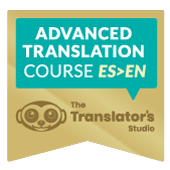
Certificate and Stamp

Study Buddies
We help trainees who want more practice to team up and work together on extra texts. The translators who’ve participated have said that they got a lot out of it. Read a student review.
Course Price
Advanced Translation Course Price
£1,399
Money-back guarantee, instalment option
- Final price. VAT isn’t applicable to this course.
- Money-back guarantee. If you complete Module 1, get your feedback and then decide you don’t want to continue, you have 30 days from when you signed up to get your money back.
Flexible start dates
Enrol when you want. Teachers available all year round with a break at Xmas.
Plenty of time
Go at your own pace. Two years to complete.
Testimonials

Alex Mollyneaux, LinkedIn.

Piers Goodwin, LinkedIn.

Robert Whippy, LinkedIn.
FAQ
Course FAQ
What are the course dates?
I don't know whether I need the Advanced Course or the Conversion Course.
What is the DipTrans exam?
The Diploma in Translation or DipTrans exam is an exam offered by the Chartered Institute of Linguists, UK. It’s a post-graduate qualification. You can read all about it in this post on our blog.
I'm looking for a DipTrans prepartory course. Is this course right for me?
I don’t want to do the DipTrans exam. Is the course suitable for me?
While the course contains information on exam technique, the vast majority of the content will suit different goals. The past papers used for assessment provide an excellent all-round challenge for any translator wishing to take their skills to the next level. Our feedback is adapted to you, which means we can make this training about your goals.
I’m a native speaker of US English. Is the course suitable for me?
My first language is Spanish/French. Is the course right for me?
Is there a reading list?
Yes, we provide a range of recommendations for extra reading on translation theory, reference materials for the DipTrans exam and style guides. This article contains our top picks.
I don’t know whether to do the DipTrans or an MA
We’ve also published this article to help you: “MA in Translation Studies and DipTrans: A Perplexed Translator’s Guide“.
I’m a DipTrans re-sitter and I don’t need to practise for all of the papers. Can you adapt?
Do you have any statistics on your candidates' success rate?
Success in the DipTrans exam normally comes down to the translator having the appropriate training and experience. Candidates sometimes come to us after having signed up for the DipTrans without consulting us first. Students may also choose to start with our Advanced Course despite our advice to start with our Conversion Course. In these cases, they will typically be underprepared for the DipTrans exam and there’s often little we can do to help them secure a pass at first sitting.
That being said, in the January 2021 DipTrans exam, we had 10 candidates who sat a total of 24 papers. Between them, they obtained 15 passes or higher. This meant that candidates who had completed our advanced course achived a success rate of 63%, which is well above the usual success rate of about 25%. Three of our students passed all three papers on their first attempt. Among our candidates, there was one distinction and four merits.
Regarding the 2021 resitters, they sat a total of four papers between them and achived a pass rate of 50%. One of our resitters kindly told us: “I don’t think I would have had a chance without your preparation course and all the great feedback and advice. I can’t thank you enough!”
Is the cost of the DipTrans exam included in the course price?
How can I get more information about your course?
Where can I find more reviews?
You can also see reviews about Gwenydd Jones as a trainer on her trainer review page on ProZ.com, where numerous webinar attendees have commented.
If you’d like to email a past trainee for a reference, then we can ask if someone would be willing to assist you.










